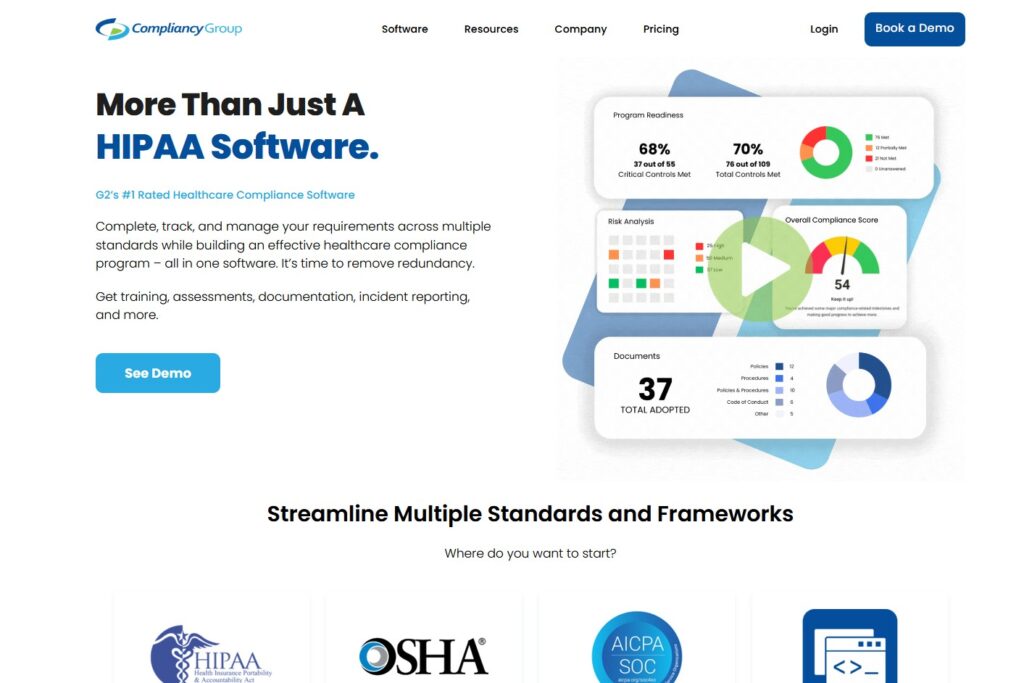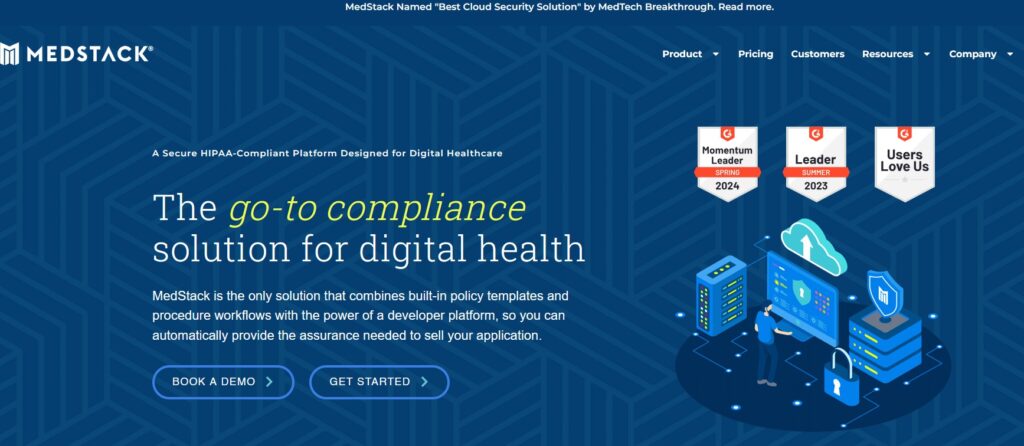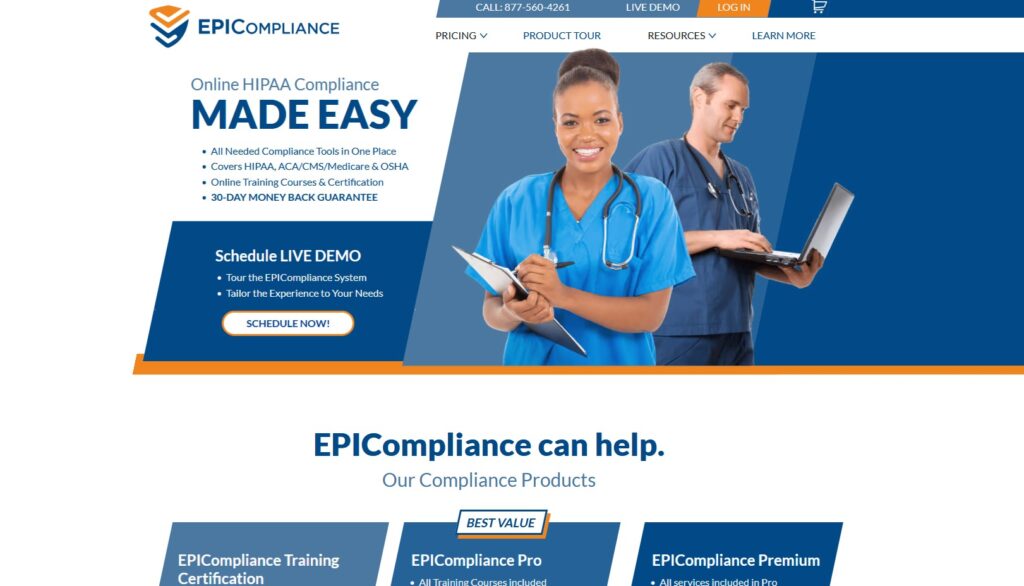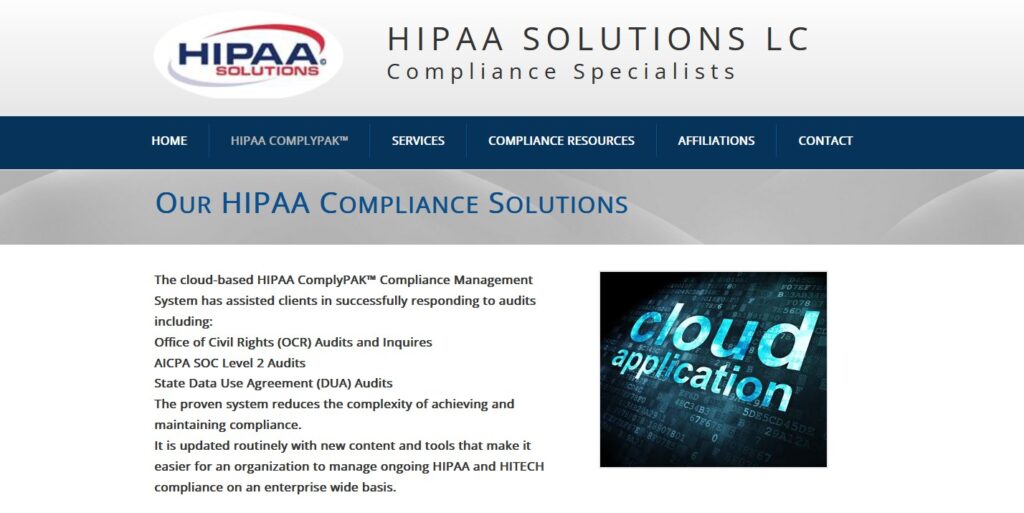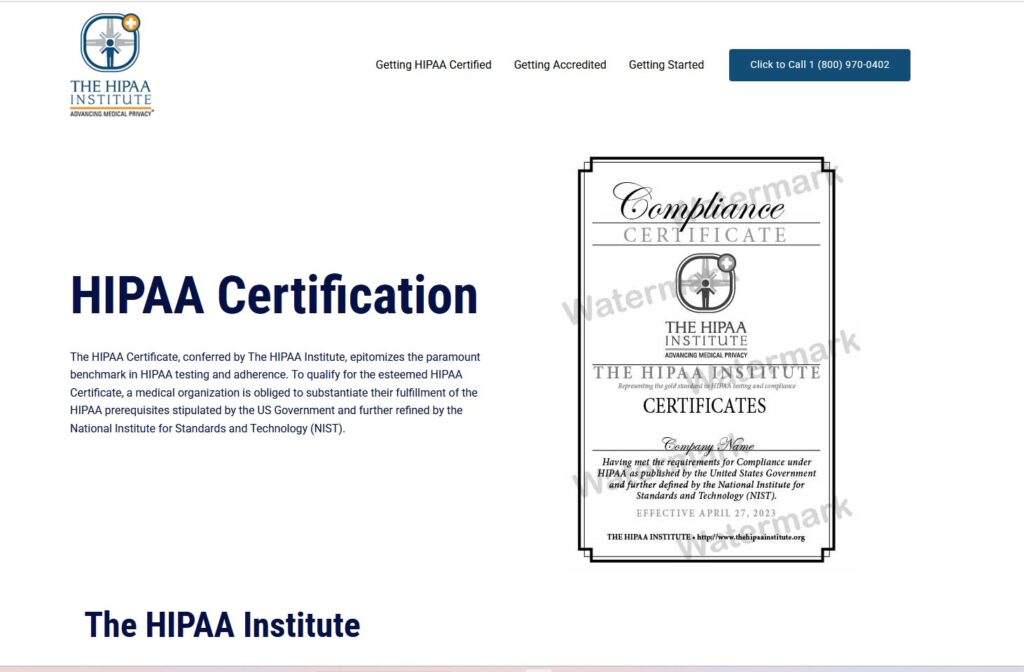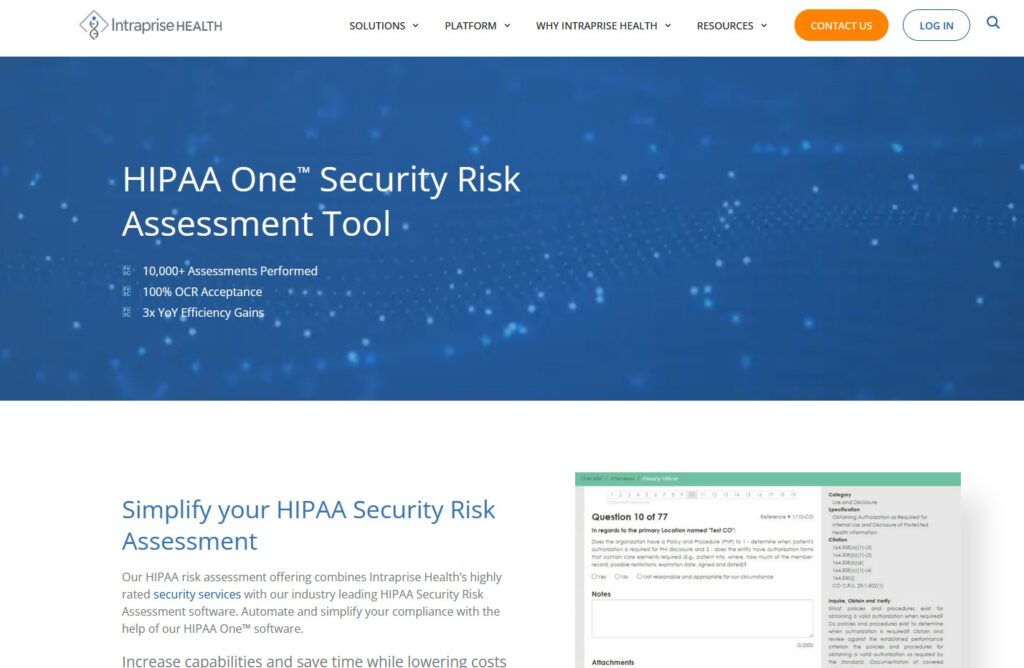Safeguarding patient information is mandatory for healthcare companies because misuse can have serious consequences for patients. Given its importance, the government has mandated data privacy and security through a 1996 federal law called The Health Insurance Portability and Accountability Act (HIPAA).
For healthcare organizations, meeting this compliance is challenging because of their limited resources and technical knowledge. This is where HIPAA compliance software steps in. Designed to help organizations meet stringent regulatory requirements, these tools simplify compliance management by automating processes, providing real-time insights, and maintaining data security. When compared to manual processes, these tools save time, costs, and effort while reducing human errors.
In this guide, we’ll review the best HIPAA compliance software available today, including how each tool addresses specific compliance needs, stands out in the market, and supports healthcare providers in protecting patient information.
What is HIPAA Compliance Software?
HIPAA compliance software is a specialized tech platform that enables healthcare organizations to meet HIPAA’s regulatory requirements. These tools support compliance efforts with features like risk assessments, policy management, employee training, and audit preparation.
At its core, HIPAA compliance software safeguards the confidentiality, integrity, and availability of Protected Health Information (PHI), as outlined in HIPAA. Additionally, organizations can use these platforms to track compliance measures, identify vulnerabilities, and maintain the necessary documentation to demonstrate adherence during audits.
HIPAA compliance software enables healthcare providers and their business associates to meet their obligations under HIPAA by:
- Automating tasks like policy management, employee training, and audit preparation, reducing administrative burdens and human error.
- Securing patient information through encryption, access controls, and regular monitoring.
- Implementing robust access control mechanisms to restrict PHI access to authorized users only.
- Offering intrusion detection, breach reporting, and secure data storage to prevent unauthorized access or data breaches.
- Supporting regular risk assessments and providing actionable insights to address vulnerabilities before they become compliance issues.
- Maintaining comprehensive logs and documentation to keep organizations audit-ready at any time.
Essentially, HIPAA compliance solutions simplify these complex processes, so healthcare organizations can focus on patient care.
Key Features to Look for in HIPAA Compliance Software
Here are the key features to consider while selecting the best HIPAA compliance software.
Data Encryption
Encryption is the backbone of PHI security. The software should encrypt data both at rest and in transit. This way, even if data is intercepted, it remains unreadable without the proper decryption key.
Access Control
Access control mechanisms allow only authorized personnel to view or modify PHI. Look for HIPAA compliance service providers that support role-based access to limit access based on the user’s job function and Multi-factor Authentication (MFA) for an extra layer of security beyond just passwords.
Audit Logging
Audit logging tracks every action performed within the system, such as who accessed PHI, when, and what changes were made. This feature is essential for monitoring compliance and preparing for audits.
Compliance Reporting Tools
Comprehensive reporting can generate detailed compliance reports, making it easier to demonstrate adherence during audits. Ideally, look for features like risk analysis summaries, incident reports, and user activity logs.
Regular Updates and Maintenance
Your HIPAA-compliant software must get regular updates to address any changes in HIPAA guidelines, as well as emerging risks.
Policy and Procedure Management
Effective HIPAA compliance software must include tools for creating, storing, and distributing HIPAA-related policies that employees can access when needed.
Risk Assessment Tools
Automated risk assessment tools identify potential vulnerabilities in your systems and provide actionable recommendations to mitigate them.
Training Modules
Training modules should be a part of your HIPAA compliance software checklist as they educate your staff on best practices for safeguarding PHI.
Incident Management
Any HIPAA compliance software requirements must include incident tracking and breach notification features to help organizations respond quickly and efficiently in case of security events.
Scalability and Integration
The HIPAA compliance software should scale well with your growth and integrate seamlessly with existing systems like Electronic Health Records (EHRs) or practice management software.
Thus, these are the features to consider. Next, let’s review the top HIPAA-compliant software to assess how well they meet the above requirements.
Best HIPAA Compliance Software Solutions
Below is a detailed review of top HIPAA compliance software solutions.
1. Compliancy Group Healthcare Compliance
Source: Compliancy Group
Compliancy Group offers an all-in-one HIPAA compliance software called “The Guard” to help organizations manage their compliance while focusing on their operations.
Key Features
- Supports risk assessments to identify operational and regulatory vulnerabilities.
- Helps to create, distribute, and track policies. Its automated notifications ensure that all employees know the latest guidelines.
- Provides extensive training modules for staff on compliance topics, complete with tracking capabilities to monitor progress.
- Its real-time incident reporting and management tools enable organizations to respond swiftly to compliance breaches.
- Generates detailed reports for audits.
- Offers tools for managing Business Associate Agreements (BAAs) and assessing vendor privacy standards.
Pricing
This HIPAA compliance service provider has three pricing plans for both healthcare providers and vendors, namely, Essential, Professional, and Enterprise.
Click here for a custom quote.
Overall, Compliancy Group is suited for healthcare organizations and vendors of all sizes.
Pros:
- User-friendly interface.
- Comprehensive support.
- Cost-efficient.
- Regular updates.
Cons:
- Annual pricing model.
2. MedStack
Source: Medstack
MedStack offers out-of-the-box HIPAA controls and privacy policies to streamline compliance. Moreover, it comes with a developer platform to support digital healthcare companies.
Key Features
- Uses industry-standard encryption, access controls, and monitoring.
- Enables organizations to create, communicate, and enforce policies uniformly.
- Provides a centralized system for tracking and managing compliance incidents.
- Enables risk evaluations to identify vulnerabilities.
- Offers pre-built templates and processes for audit readiness.
- Evaluates vendors’ compliance status.
- Generates detailed reports for audits and decision-making.
- Focuses on technical security measures.
Pricing
MedStack offers three plans:
- Exos – $499/month when billed annually and $599/month when billed monthly.
- MedStack Control – $1,199/month when billed annually and $1,499/month when billed monthly.
- Exos + MedStack Control – $1,599/month when billed annually and $1,899/month when billed monthly.
MedStack is a good choice for digital health startups, growing companies, and app developers looking to build HIPAA-compliant solutions.
Pros:
- Easy to use.
- Automation features.
- Built-in training modules.
- Scalable.
Cons:
- Expensive.
- Suited for digital-first companies.
3. EPICompliance Online HIPAA & Healthcare Compliance
Source: EPICompliance
EPICompliance is a web-based HIPAA-compliance platform that makes it easy for healthcare providers and practices to comply with these regulations.
Key Features
- Comes with an updated library of HIPAA policies and standardized forms that can be customized.
- Offers online training programs.
- Automates compliance processes, including sending reminders and monitoring task completions.
- Supports incident management for proactive resolution.
- Enables companies to prepare for audits.
Pricing
EPICompliance offers three plans:
- EPICompliance training Certification.- $36/user.
- EPICompliance Pro – $95/month.
- EPICompliance Premium – $695/month.
In all, EPICompliance is ideal for independent clinics, outpatient facilities, and small hospitals.
Pros:
- Affordable.
- User-friendly dashboards.
- Customizable.
Cons:
- Limited scalability.
4. CDW HIPAA Risk Advisor
CDW’s HIPAA Risk Advisor is part of their broader cybersecurity and compliance services and can help healthcare organizations meet HIPAA regulations.
Key Features
- Advanced security features like encryption, data loss prevention, mobile security, threat prevention, and social engineering/phishing.
- Offers detailed compliance gap analysis, and security and vulnerability assessments.
- Supports virtual and on-site consultations.
- Provides incident management plans, emergency assistance, and proactive measures for managing breaches.
- Helps create and manage security policies.
Pricing
Contact the support team at 1-800-800-4239.
Overall, this HIPAA compliance software is better suited for large healthcare providers and multi-location organizations.
Pros:
- Tailored compliance strategies.
- Combines consulting with tools.
- Wider cybersecurity solutions.
Cons:
- Greater focus on security.
- Too complex for small practices.
5. Emerald Cybersecurity HIPAA Solution
Emerald Cybersecurity offers cloud-based HIPAA compliance software that comes with thorough risk assessments and compliance. It helps organizations navigate through HIPAA challenges.
Key Features
- Pairs consulting with software for comprehensive outcomes.
- Assesses hardware, software, business associates, facilities, and physical records for complete gap analysis.
- Generates detailed reports.
- Creates and manages mitigation plans.
- Offers privacy and security controls.
Pricing
Custom quote.
Emerald Cybersecurity HIPAA solution is well-suited for large organizations with complex needs and those who prefer to leverage consulting and cybersecurity services.
Pros:
- Strong focus on data security.
- Combines security, consulting, and compliance.
- Quick implementation.
Cons:
- Expensive.
- Not for small practices.
6. ComplyPAK by HIPAA Solutions
Source: ComplyPAK
ComplyPAK is a cloud-based solution that integrates training, reporting, and policy management for HIPAA compliance.
Key Features
- Offers comprehensive risk assessments and audits.
- Comes with pre-built policies and procedures that can be customized.
- Provides support for internal and external audits.
- Monitors compliance activities and generates on-demand reports.
- Supports online training options for employees.
Pricing
There are three versions, namely, basic, professional, and enterprise. Contact customer support for a quote.
Overall, ComplyPAK works well for healthcare organizations that want to balance automation and compliance.
Pros:
- Comprehensive compliance.
- User-friendly interface.
- Regular updates.
- Audit services.
Cons:
- Limited customer support.
7. HIPAA Institute
Source: The HIPAA Institute
The HIPAA Institute focuses on compliance through certification programs, training, and risk management services. Its goal is to establish a fundamental level of HIPAA awareness and expertise for IT professionals.
Key Features
- Offers a comprehensive certification program.
- Provides meticulous documentation and employee training.
- Helps maintain detailed documentation for audit purposes.
- Mandates periodic evaluations of security measures.
Pricing
Get a custom quote
The HIPAA Institute is well-suited for small healthcare practices and business associates.
Pros:
- Established reputation.
- Complete policy and training.
- Expert insights.
Cons:
- Limited scalability.
- The focus is on training and certification.
8. HIPAA One by Modern Compliance Solutions
Source: Intraprise Health
HIPAA One is a cloud-based platform that assesses the HIPAA requirements of organizations. It also streamlines compliance and provides complete training.
Key Features
- Automates HIPAA security risk assessments.
- Assesses vulnerabilities on all devices, networks, and applications.
- Provides online courses for employees.
- Creates, organizes, and manages vendor contracts.
Pricing
Contact the team for a custom quote.
HIPAA One is a good choice for medium to large healthcare organizations and IT service providers.
Each of these tools offers unique features tailored to different organizational needs. Selecting the right software will depend on your organization’s size, budget, and specific compliance challenges.
Pros:
- Focus on risk management.
- Scalable.
- Flexible training.
- Excellent support.
Cons:
- Expensive.
How to Choose the Right HIPAA Compliance Software for Your Organization
Selecting the best HIPAA compliance software for your organization requires careful consideration. Here are the key criteria to evaluate.
Ease of Use
Compliance tools should simplify the complex process of meeting HIPAA requirements. Look for software with an intuitive interface and features like guided risk assessments, pre-configured templates, and automated alerts.
Questions to Ask
- How quickly can new users learn the system?
- Is navigation straightforward?
- Are key tasks like policy management and audit tracking easy to perform?
Customer Support
Exceptional customer support is essential, particularly when dealing with compliance complexities or urgent issues like breach management. Ensure the vendor provides responsive and knowledgeable support.
Questions to Ask
- Availability of live chat, phone, and email support.
- Whether support includes live compliance coaching or consultation.
- Turnaround time for resolving technical or compliance-related queries.
Pricing
Cost is always a factor, especially for small to medium-sized organizations. While affordability is important, be cautious of choosing a cheaper solution that lacks essential features.
Questions to Ask
- Does the pricing align with your organization’s budget?
- Are there hidden fees for add-ons or upgrades?
- Does the software offer a free trial or demo to evaluate its capabilities?
Scalability
As your organization grows, your compliance needs may become more complex. Scalable software ensures you won’t outgrow the tool as your team or IT infrastructure expands.
Questions to Ask
- Does the software support additional users or locations without significant cost increases?
- Can it adapt to evolving regulatory requirements?
- Is it equipped to handle larger volumes of data or more intricate workflows?
Certifications and Regulatory Expertise
A reliable HIPAA compliance solution should adhere to industry standards and demonstrate expertise in regulatory compliance. Look for certifications and partnerships that validate the software’s credibility.
Questions to Ask
- Does the vendor offer evidence of HIPAA compliance, such as third-party audits or certifications?
- Are there testimonials or case studies that showcase the software’s effectiveness?
- Does the vendor stay updated with changes to HIPAA regulations?
You can select the best fit for your needs using the above criteria.
General HIPAA Compliance Software Checklist
Use the below checklist to evaluate whether the software provides the necessary features and capabilities for safeguarding PHI.
- Encryption
- Access controls
- Audit logging
- Automatic data backup
- Intrusion detection
- Risk assessments
- Policy and procedure templates
- Incident management
- Compliance reports
- Regular updates
- Employee training modules
- Policy acknowledgement tracking
- Multi-location support
- Integration capabilities
- Customization options.
- 24/7 support
- Comprehensive documentation
- Live consultations
- Transparent pricing
- Free trial or demo
This checklist ensures that the HIPAA compliance software you choose is comprehensive, secure, and capable of meeting your organization’s compliance requirements.
Invest in the Right HIPAA Compliance Software
HIPAA compliance software eases the compliance requirements for healthcare organizations by automating processes, handling audits and assessments, and managing policies. Some providers even offer consulting services to avoid data breaches.
However, the key is to invest in the right platform that best matches an organization’s size and requirements. Take the time to explore and assess the options discussed in this article to make an informed decision that benefits your organization in the long run.

